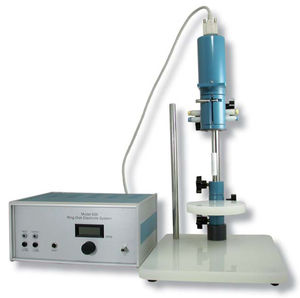
- Metrology - Laboratory
- Analytical Instrumentation
- Carbon electrochemical electrode
- Princeton Applied Research
Rotating disk electrochemical electrode Model 616Acarbon
Add to favorites
Compare this product
Characteristics
- Type
- rotating disk
- Material
- carbon
Description
The Princeton Applied Research Model 616A Electrode Rotator is a high precision, low mass rotator that performs well with virtually any potentiostat. When connected to Princeton Applied Research electrochemical instrumentation, it uses control lines to give you remote start/stop and speed control. Using the convenient control panel and input jacks you can operate the model 616 easily for either manual or automated experiments.
Standard features include:
Front panel speed controls
Protective enclosure
Remote analog speed control (input is summed with front panel settings)
Front Panel and remote (TTL) on/off switching (using Princeton Applied Research stir-control signals)
Remote analog output for speed verification
Integral ring-stand for convenient cell mounting
For versatility, a variety of electrode assemblies are available to perform a wide range of experiments, including:
High precision corrosion measurements
Ultra-trace analytical determinations
Automated Levich Plots
Hydrodynamically-modulated voltammetry
Cyclic stripping voltammetry
Catalogs
No catalogs are available for this product.
See all of Princeton Applied Research‘s catalogsOther Princeton Applied Research products
Electrochemical Accessories
*Prices are pre-tax. They exclude delivery charges and customs duties and do not include additional charges for installation or activation options. Prices are indicative only and may vary by country, with changes to the cost of raw materials and exchange rates.



